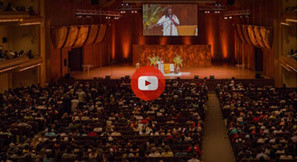Bangalore, India

See, what is the significance of the Guru Disciple Tradition? It is for the Disciple to realize that desires are endless.
‘Like the waves of the ocean desires keep coming one after the other. That is why I must keep my desires aside and do as per the Guru desires. ’
When you do this then the mind becomes hollow and empty and you start feeling a sense of lightness. Life then moves beyond joy and sorrow, and all craving and aversion automatically disappear.
This is the only way to remove cravings and aversions.
That is why it is said, ‘Na Guror Adhikam, Na Guror Adhikam, Na Guror Adhikam’ (There is nothing greater than Guru, there is nothing greater than Guru, there is nothing greater than Guru because Guru is the embodiment of all that is greatest.)
So leave everything on the Guru, and surrender to the Guru.
Fulfillment cannot be achieved through desires because if one desire is fulfilled another one comes, and if that is fulfilled another one comes. And then the mind keeps wandering between desires. Some desire or another will keep troubling your mind day and night.
Do you know, if there is anything in this world that troubles you, the topmost on the list is your own mind!
I am saying topmost because you do not see this. You feel that someone else is bothering you. You think your mother in law is troubling you, or your daughter-in-law is troubling you, or your wife or husband is troubling you. Keep all that as second on the list.
It is your own mind which is troubling you; there is no other enemy out there. Once you realize this you will understand that it is not the other, all the botherations are of the mind.
This cannot be explained, this can only be experienced.
Till the time it becomes your experience just take the words and don’t look for an explanation.
If I say laddoo is sweet and if you ask, ‘How is laddoo sweet?’ I have no idea. I will say, ‘Just wait till you get a laddoo in your hand and put it in your mouth, then you feel it.’
In the same way when you hear the Vedantic Truth, the more explanation you seek, the more confused you become.
Vedantic words are to be heard and just allowed to sink. When it sinks in, then it comes as an experience.
If I say I am Divine, you will ask me, ‘How come you are Divine and how is it that I am Divine?’ There is no way to explain. When you go deep into meditation, you suddenly realize, ‘Ah, I am Divine.’
Just now I was meeting the Iranian group and one gentleman was telling me a story. He is making a movie, and he said that in the movie a group of 30 people go to seek God to some mystic place. So, they go and seek and finally what happens is that they see their reflection in the water and say, ‘Now I have found – I am God.’
Similar stories are there in the Pañcatantra, you seek something that you already have. But the seeking is essential because it takes you one whole round till you get to that point where you realize Anhalhak (meaning: I am the Creator), it’s an Urdu word.
The same thing has been said in Vedanta – Aham Brahmasmi (meaning: I am Brahman). So Anhalhak means Aham Brahmasmi.
But unfortunately those who said, ‘Anhalhak’, were all crucified. Their heads were cut off in the Arabic world. But in India, fortunately, that was not the case. One who said, ‘Aham Brahmasmi’, they put a nice chair for him and gave him garlands. That is what happened.
But these are truths that one needs to experience deep inside. Any explanation will spoil it.
Dive deeper into the vast knowledge of Yoga Vasistha with our exclusive online webcast series. Join now!
The Vedanta always talks about Vichara (deliberation) and Viveka (discrimination).
Even in Samadhi it is said, ‘Vichara-anugama Samadhi’ (A meditative state in which you are with some experiences, thoughts, ideas, feelings hovering around); ‘Vitarkanugama Samadhi’ (A meditative state with irrefutable logical understanding of the creation).
Even in Samadhi, Tarka (logic) is allowed.
That is why there is Savitarka Samadhi (A meditative state in which there is a dialogue or argument in one part of consciousness with the other part of the same consciousness), and Nirvitarka Samadhi (A meditative state which has no dialogue, where there is no reasoning).
Then there is Sarvichara Samadhi (one in which there is some knowledge flowing. In this state of deep Samadhi some faint thoughts move through), and Nirvichara Samadhi (one where there is no thought. This is a thoughtless state which is the experience of nothingness or just emptiness).
So Tarka, i.e., reason is not considered a bad thing, or contrary to faith. It is through reason that people go to faith, isn’t it? When your reason is satisfied then your faith is strong; then nobody can shake your faith.
If one says, ‘Once faith is there don’t reason’, that is when the faith is weak. A weak faith is always scared of reason. But truth will never be scared of reasoning.
When truth is there, in whatever manner you reason, the truth will be the same.
When you have faith in the truth, it will always stand out.
That is why Lord Krishna after giving his Upadesha (teachings), in the end he says, ‘I have said whatever I needed to say now you decide. If it appeals to your reason you take it.’
‘Yathecchasi tathā kuru’ (As you wish, you may do), this is what Lord Krishna says.
This is very important. You see, reason and faith are not in conflict here in the Orient. Especially when knowledge is based on experience, not presumptions, you don't have to worry about faith being shaken by reasoning.
Now wrong reasoning is not allowed. Logic is good but illogically if you try to condemn things then that is contrary to faith. So, an honest seeker will not use Kutarka (wrong reasoning).
An example for wrong reasoning is - if a door is half closed you can say it is half open, but if a door is fully closed it does not mean it is fully open. If you say that it is fully closed when it is fully open, it is Kutarka.
In science, first is reason and then faith. Correct? You reason out and then you start believing what appeals to reason.
‘What do say to a person who has built a home on the seashore and hates waves?’
‘What do you say to a person who has built a home in the forest and is scared of animals?’
In the same way, what do you tell a person who lives in society and is scared of accusations, blames and praises?
People blame and they say things, what can you do? Educate and ignore.
Even if you have done all good and nothing but good still people will blame you. They will see you as not right or not straight. What can you do? Nothing!
As I said, even when you have done nothing wrong still people become your enemies. How many of you here have experienced this? (Many in the audience raise their hands).
You did not do any harm to them but they have become your enemies.
Similarly, you have not done any big favors for some people but they have become your friends, isn’t it?!
So becoming a friend or an enemy works on some other special law and that is Karma.
When Karma if there you have no words or no explanation for certain happenings. That is just how it happens. So don't worry if people blame you for things that you have not done. Don't get disturbed.
It is easy to say don't get disturbed. You do get disturbed, but at that time this wisdom will help you – ’It is some strange Karma, let it be there. So what, what can we do? That is the nature of the world.’
In this way you should make yourself dispassionate. One who is dispassionate always remains joyful.
’Kasya Sukham Na Karoti Viragah’
(There is no pleasure greater than a state of mind that does not seek pleasure.)










